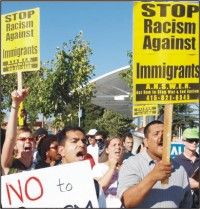Human Rights Advocacy
International Day for the Elimination of Racial Discrimination
Obstacles to development
“Racist practices hurt their victims, but they also limit the promise of entire societies where they are tolerated. They prevent individuals from realizing their potential and stop them from contributing fully to national progress.” --Ban Ki-moon, United Nations Secretary-General
The International Day for the Elimination of Racial Discrimination was first established in 1966, following a tragic event that shocks the conscience: the massacre of young students peacefully protesting against apartheid laws, adopted by the South African government, a brutal regime that applied the theory of inequality between races, regardless of humanity's moral and ethical advances. Proclaiming the International Day, the United Nations General Assembly called upon the international community to redouble its efforts to eliminate all forms of racial discrimination.
 The Committee on the Elimination of Racial Discrimination (CERD) is the body of independent experts that monitors implementation of the Convention on the Elimination of All Forms of Racial Discrimination by its State parties.
The Committee on the Elimination of Racial Discrimination (CERD) is the body of independent experts that monitors implementation of the Convention on the Elimination of All Forms of Racial Discrimination by its State parties.
All States parties are obliged to submit regular reports to the Committee on how the rights are being implemented. States must report initially one year after acceding to the Convention and then every two years. The Committee examines each report and addresses its concerns and recommendations to the State party in the form of “concluding observations”.
New forms of discrimination have arisen, in association with certain scientific developments and the process of globalization. As a result of these new threats and the outbreak of violent inter-ethnic conflicts in many parts of the world in recent years, the international community decided to convene in 2001 in Durban, South Africa, the World Conference Against Racism, Racial Discrimination, Xenophobia and Related Intolerance.
Development is a comprehensive economic, social, cultural and political process that aims at constantly improving the well-being of the entire population on the basis of everyone's active, free and meaningful participation and the fair distribution of the available resources. Racism and other forms of discrimination are not only human rights violations but also major obstacles to achieving development.
Source.www.un.org